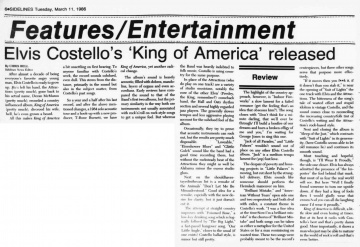Middle Tennessee State University Sidelines, March 11, 1986: Difference between revisions
(start page) |
(,+US publications by state index) |
||
| (One intermediate revision by the same user not shown) | |||
| Line 3: | Line 3: | ||
{{:Middle Tennessee State University Sidelines index}} | {{:Middle Tennessee State University Sidelines index}} | ||
{{:Tennessee publications index}} | {{:Tennessee publications index}} | ||
{{:US publications by state index}} | |||
{{Bibliography article header}} | {{Bibliography article header}} | ||
<center><h3> Elvis Costello's ''King of America'' released </h3></center> | <center><h3> Elvis Costello's ''King of America'' released </h3></center> | ||
| Line 9: | Line 10: | ||
---- | ---- | ||
{{Bibliography text}} | {{Bibliography text}} | ||
After almost a decade of being everyone's favorite angry young man, Elvis Costello is ready to grow up. He's left his band, the Attractions (pretty much); gone back to his actual name, Declan McManus (pretty much); recorded a country influenced album, ''King of America'' (pretty much); divorced his wife; hell, he's even grown a beard. | |||
All this makes ''King of America'' a bit unsettling on first hearing. To anyone familiar with Costello's work, the record sounds subdued, even dull. This stems from the distance, primarily in the sound but also in the subject matter, from Costello's past songs. | |||
So a year and a half after his last record, and after the above mentioned changes, a 1984 solo acoustic tour and a hook-up with a new producer, T-Bone Burnett, we have ''King of America'', yet another radical change. | |||
The album's sound is heavily acoustic, filled with dobros, mandolins, layers of organs and even accordions. Early reviews have compared the sound to that of the Band's first two albums, but the primary similarity is the way both use instruments not usually associated with rock 'n' roll on rock-style songs to get a unique feel. But whereas the Band was heavily indebted to folk music, Costello is using country for the same purpose. | |||
In place of the Attractions who do play on one track) are a variety of studio musicians, notably the core of the other Elvis' (Presley, the King, remember?) comeback band, the Hall and Oats rhythm section and several highly regarded jazz players. The generally slower tempos and less aggressive playing account for the subdued feel of the album. | |||
Occasionally, they try to prove that acoustic instruments can rock out, but the results are pretty much disposable. "Loveable," "Eisenhower Blues" and "Glitter Gulch" sound like the band had a good time recording them, but without the rocksteady beat of the Attractions they might as well be Alabama minus the excess studio gloss. | |||
Next on the shouldhavestayedinthecan list is a remake of the Animals' "Don't Let Me Be Misunderstood." Good idea for a remake, especially with the new desire for clarity, but it just doesn't cut it. | |||
The attempt at straight country improves with "Poisoned Hose." a low-key drinking song which is logically followed by "The Big Light." a fast-paced hangover song. "Our Little Angle," closer to the usual (if one exists) Costello ballad style, is minor but still pretty. | |||
The highlight of the country approach, however, is "Indoor Fireworks" a slow lament for a failed romance (get the feeling that's an idea that obsesses him?). The song closes with "Don't think for a minute darling, that well ever be through/ Ill build a bonfire of our dreams and burn a broken effigy of me and you," I'm waiting for George Jones to sing this one. | |||
"Jack of all Parades," and "Little Palaces" wouldn't sound out of place on any other Elvis Costello album. "Jack" is a medium tempo lament for (yep) lost love. | |||
The despair of poverty and housing projects in "Little Palaces" is moving, but cut short by the strangled delivery. Elvis sounds like someone should perform the Heimlech maneuver on him. | |||
"Brilliant Mistake," and "American Without Tears" open side one and two respectively and both deal with exiles, a constant theme. in Costello's work. ''"I was a fine idea at the time / Now I'm a brilliant mistake"'' is the chorus of "Brilliant Mistake" and both songs can be taken as either a metaphor for the United States or for a man reminiscing on wasted time. These two songs were probably meant to be the record's centerpieces, but three other songs serve that purpose more effectively. | |||
''"If it moves then you f**k it, if it doesn't than you stab it,"'' is near the opening of "Suit of Lights" the one track with Elvis and the Attractions. The bitterness of the song's tale of wasted effort and stupid idolism is vintage Costello, and the sound comes close to reconciling the increasing country/folk tint of Costello's writing and the Attraction's rock-based style. | |||
Next and dosing the album is "Sleep of the Just," which contrasts with "Suit of Lights" in its generosity, (here Costello seems able to let old romance lie) and continues its smooth sound. | |||
Most touching and hopeful, though, is "I'll Wear It Proudly." the side one closer. Elvis has always admitted the presence of "the Imposter" the fool behind that mask. that most of us fear the real world will see. But here ''"Well I finally found someone to turn me upside down... if they had a king of fools then I would gladly wear that crown / And you can all die laughing cause I'd wear it proudly"'' | |||
''King of America'' is difficult, a little slow and even boring at times. But at its best it ranks with Costello's best and that's pretty damn good. More importantly, it shows a man who just may be able to mature in the world of rock 'n' roll and that's even better. | |||
{{cx}} | {{cx}} | ||
Latest revision as of 04:53, 25 February 2016
|

